How to Rent Your First Apartment
The day is finally here, you’re ready to spread your wings and venture out into the world by taking the first major step: renting your first apartment. And yes, it can all be a bit daunting, but also quite exciting, and with a bit of prep, you can make this first step an easy stress-free experience. As with any big step in life it’s important to “Know your numbers” as Marcus likes to say. So, when it comes to renting your first apartment, the first thing you should do is establish a budget. This is going to include more than just the cost of your monthly rent; you have to account for other expenses that go with setting up your first place.
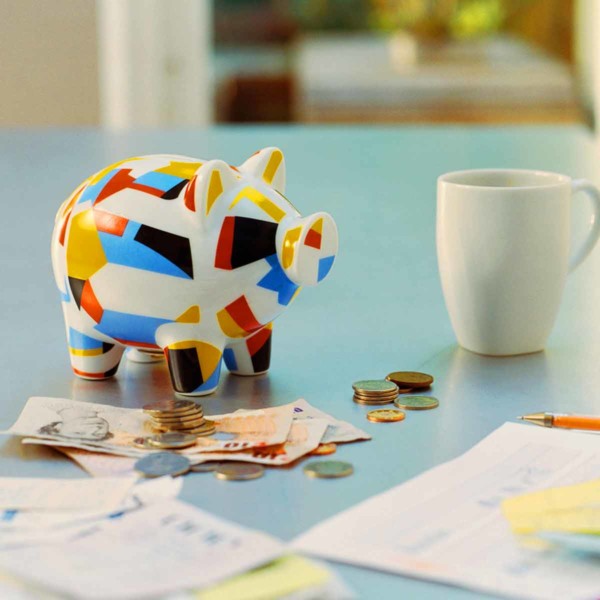
Monthly Rent
When renting your first apartment, you’ll need to decide how much money you want to spend on rent every month. Many experts suggest basing this figure off your monthly net income, which is how much money from your paycheck is available to you after taxes. They also advise that no more than 50% of your net income every month should be spent on rent, but suggest you’ll be in much better shape if you keep ALL of your monthly living expenses to less than 50% of your net monthly income. What other living expenses besides rent need to be considered?
Monthly Expenses
Utility bills, such as electricity and water, are essential to making your space liveable, and are usually not included in the cost of monthly rent. Additionally, if you want cable and internet in your apartment, you’ll have to factor in these monthly costs as well. Some apartments also charge a monthly vehicle parking fee, so this cost needs to be planned for, especially if you have more than one vehicle. Many people also opt for renter’s insurance in case of fire, flood, or theft, and while a number of companies offer very affordable policies, it will be another recurring cost to think about.
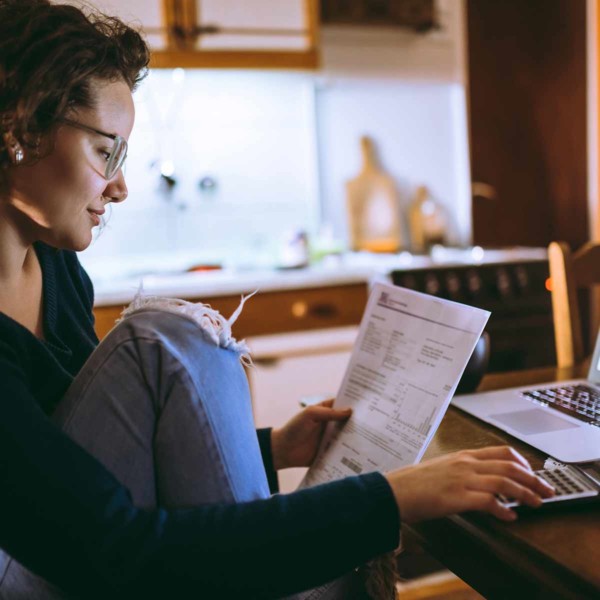
One-time Expenses
In addition to the recurring expenses that you’ll need to budget for every month, you’ll also likely incur one-time costs of moving. Most of the time, leasing an apartment will require paying the first month and last month of rent up front, as well as a security deposit equal to one month’s rent in case of damages. This means that you’ll need to have up to three times the amount of your monthly rent on hand in cash before you’ll be ready to sign a lease. Some apartments or landlords will charge application fees, deposits for any pets you might be bringing with you, or move-in fees. Don’t forget that renting a moving truck, hiring professional movers, or even buying boxes and tape are all things you might need to pay for as well.
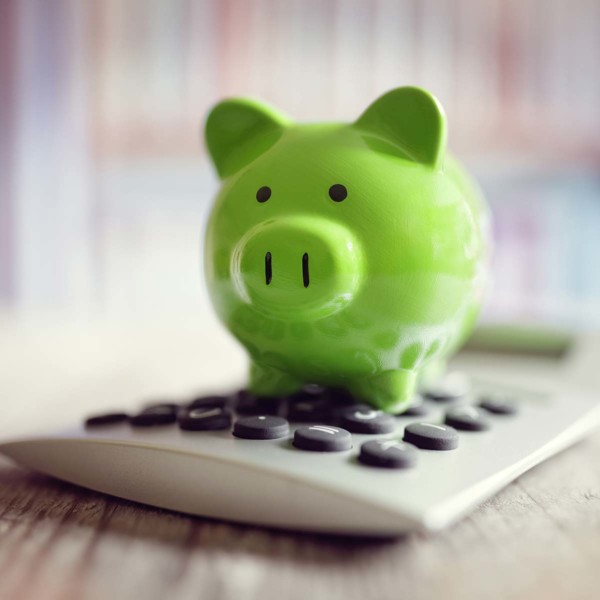
Living Essentials
Before you sign on the dotted line, consider this: do you have everything you need to live on your own? Essentials for you may include household goods such as a toaster, kitchenware, an iron, cleaning supplies and furniture such as a sofa, kitchen table and chairs, and bookshelves, just to name a few. If you need to, you can buy these items a few at a time as you go. Just make sure you plan in advance to decide what you’ll need and when; this will prevent any surprises and can help you avoid needing to buy everything at once with a credit card. Speaking of surprises, you never know what life is going to throw your way, so it’s a great idea to keep a stash of cash that you have immediately available to you, and that’s there just in case of emergencies.
If you’re not sure where to start when creating your budget, there are many online resources and apps for your smartphone available to help you figure out your budget easily and with little to no stress.
Now that you know what your budget will look like, it’s time to get to the fun part.
What do you want your first place to be like?
Once you have a sense of what you’re going to spend on your new pad every month, it’s time to ask yourself what you want. Renting your first apartment means deciding how big a place and how many bedrooms or bathrooms you’ll be looking for, and making sure you adjust as necessary for your budget. You’ll also want to make sure your apartment has the appliances you’re looking for (refrigerator, dishwasher, etc.), and whether it has a washer and dryer inside the unit, laundry facilities in the building, or laundry services close by. Some other questions you want to ask yourself include: Do you want a building with amenities such as a pool, tennis courts, green space? Are you looking for a gated community or on-site security? Are you allowed to bring your pets along? Is there space for your car, or is public transportation close by? Asking all of these questions beforehand will help you to eliminate options up front that don’t meet your needs.

Location
Have you thought about where you want to live? When renting your first apartment, this is one of the biggest questions to take into account. Proximity to important places in your life, such as work, school, and the homes of family or friends may be one of the biggest factors in choosing the location of your new apartment. You’ll also want to choose a neighborhood that you feel safe in, and that fits your lifestyle. Somewhere central or close to the things you like to do in your off time (restaurants, gym, outdoor activities, etc.) can prove to be a deciding factor. Make sure to walk and drive around the neighborhood during the day and at night to get a feel for the area. You might even try to check out the condition of the neighborhood during a few days of strong rain or snow to see how the area fares during rough weather.
Another thing to think about is where in the building you’d like to live. Would you prefer a higher floor, or a lower floor? A central unit, or a corner one? How would you feel if your apartment overlooked a busy street, or if it was close to the elevator on your floor? If you’re not sure, ask around to those you know that live in apartments for a list of pros and cons.
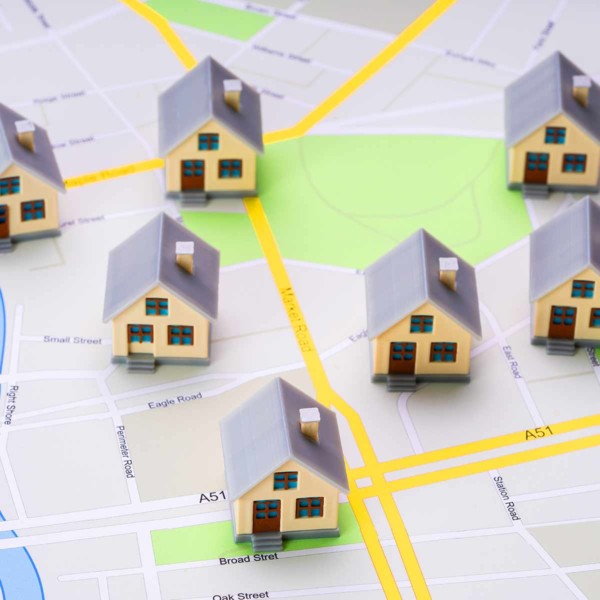
Apartment Tour
Once you’ve chosen one or several apartments that meet your requirements and look interesting, it’s time to schedule some walk-throughs. Before renting your first apartment you’ll want to get a glimpse at what life will be like for you in that building. You might be able to observe some of your potential neighbors, or even speak with them about their experiences there.
As you walk through the apartment you’re considering, be on the lookout for some important yet often overlooked things to consider when renting your first apartment, such as:
- Locks on doors and windows (and for that matter, at the building entrances). Make sure they’re in proper working order; condensation on windows is a telltale sign that they aren’t.
- Slanted or warped floors, or spotted walls or ceilings, all of which may indicate a previous major water leak.
- Running some water out of the sinks and bathtubs, to check pressure and water color.
- Turning on lights to check for burnt bulbs or fuses.
- Ensuring there are plenty of electrical outlets and/or cable connections in the places you want them.
- Checking out how much natural sunlight you get through windows, which can affect the feel of your place, your mood, and heating/cooling costs.
- Cell phone service. If your carrier doesn’t have service inside your apartment, it may be a dealbreaker for you.
- Condition of appliances. Turn appliances on and off to check that they function correctly. Ask about old or damaged appliances being replaced or repaired prior to you moving in, and getting written confirmation if you’re able to.
- Signs of pests. Living or dead insects, holes in the wall, or termite droppings may indicate existing problems and poor pest control.
- Thin walls/doors. If you can hear loud noise from other apartments or the hallway, it’s a good bet that you’ll be disturbed when you don’t want to be.
- Condition of stairwells, common facilities, and amenities. Ask to view them in person to get an overall sense of how well the building is maintained.
- Access for guests. Make sure you can have friends and family over to visit or even throw a party if it’s something that is important to you.
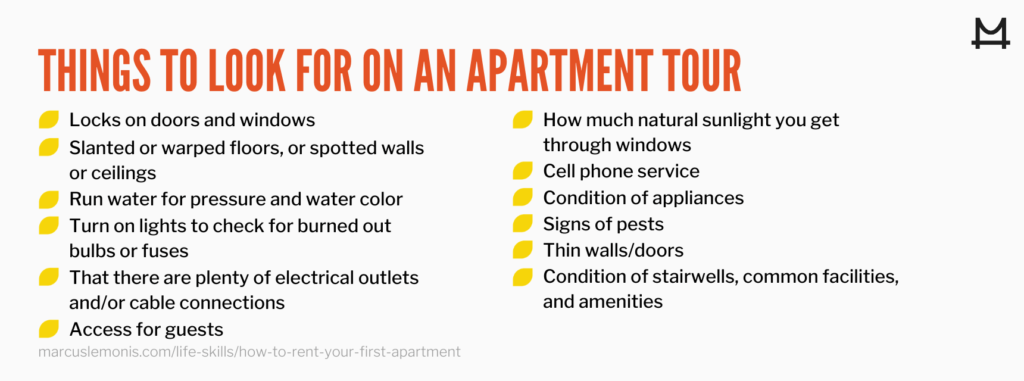
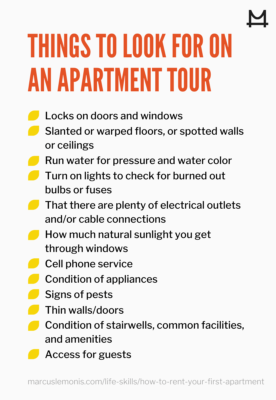
Rental Application
Once you think you may have found the right place for you, it will be time to submit a rental application. Renting your first apartment also involves your landlord or rental company making sure that you’ll be the kind of tenant they want to do business with. They will likely ask you for a photo ID such as a driver license, your social security card, your most recent bank statement, and one or several recent pay stubs, or a W2 form.
Many will also ask for letters of reference from those who know you best, such as family, friends, past or current employers, or previous landlords. It would be a great idea to ask for these letters at the start of your search, so that they’re ready to go when the rental application is due. Depending on your credit history, your landlord or rental company may ask for a co-signer to reassure them that the rent will be paid on time. If this is the case, talk to a close family member or close friend to see if they would be willing to co-sign on your apartment with you.
Expect to wait several business days for your application to be reviewed.
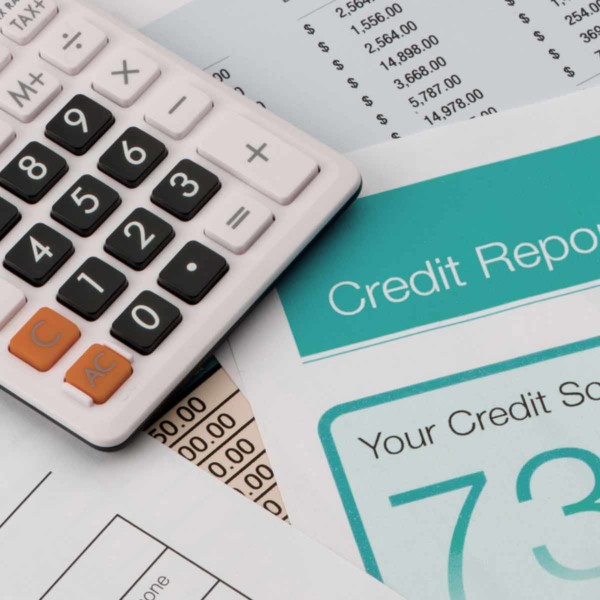
Lease
If your application is accepted, you will be presented with the final step in renting your first apartment: a lease agreement. As with any legal document, it’s important to review the lease thoroughly, and ask for more information about anything that is unclear to you. The lease should contain information such as when your rent is due, what forms of payment are accepted, penalties for late payments, additional fees that are your responsibility, parking procedures, guest and pet policies, notifying of maintenance problems and how to get them fixed, and to what extent you can decorate inside and outside the apartment. The lease should also indicate the start and end dates of the agreement, and early termination and end-of-lease policies.
If there’s something you’re not comfortable with, discuss it with your landlord or property manager prior to signing. You may find that they have flexibility in some areas, and that you’ll be able to negotiate a change of terms to better suit you.
Once your lease is signed, coordinate a move-in day, and get ready to enjoy your new digs!
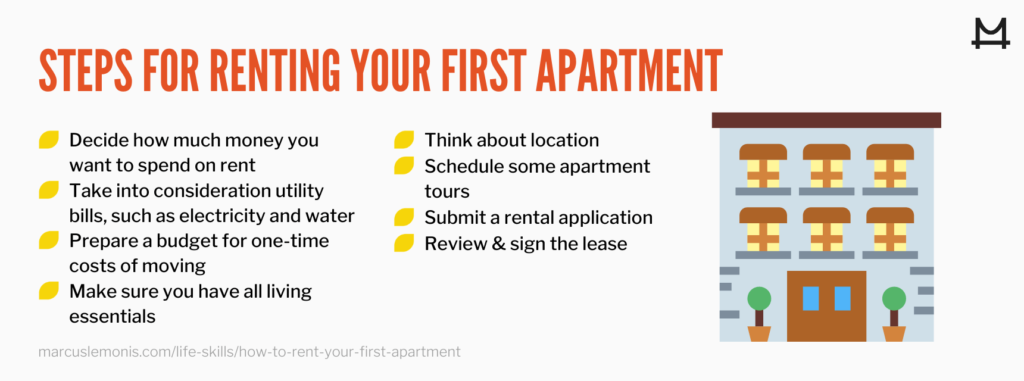
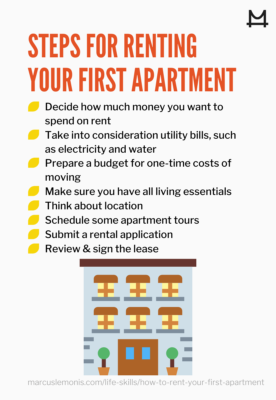
Renting your first apartment can be time-consuming, but it doesn’t have to be stressful. With some careful thought and planning, you’ll be well on your way to making the best of this new and exciting chapter in your life!
- How do you prepare for renting an apartment?
- Did you learn anything that you can use in your next apartment search?





